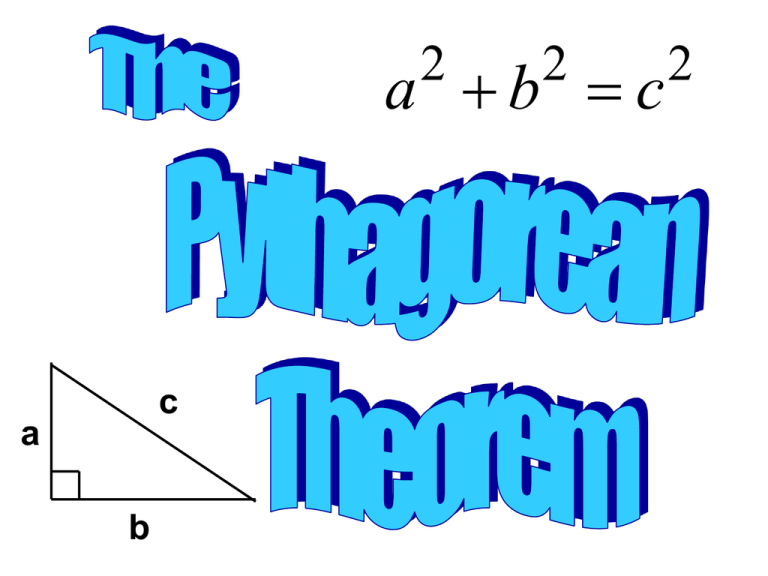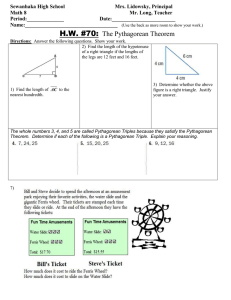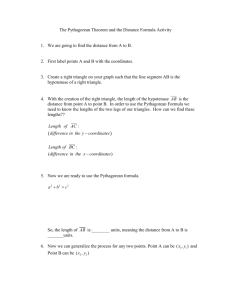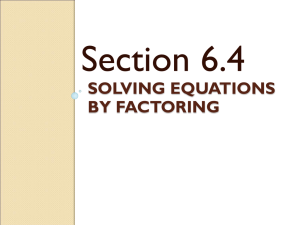c b a
advertisement

a b c 2 c a b 2 2 Pythagorean Theorem Essential Questions How is the Pythagorean Theorem used to identify side lengths? When can the Pythagorean Theorem be used to solve real life patterns? This is a right triangle: We call it a right triangle because it contains a right angle. The measure of a right o angle is 90 90o The little square in the angle tells you it is a right angle. 90o About 2,500 years ago, a Greek mathematician named Pythagoras discovered a special relationship between the sides of right triangles. Pythagoras realized that if you have a right triangle, 5 3 4 and you square the lengths of the two sides that make up the right angle, 5 3 2 4 3 4 2 and add them together, 5 3 3 4 2 4 2 you get the same number you would get by squaring the other side. 5 3 3 4 5 2 4 2 2 Is that correct? 2 ? 3 4 5 2 ? 2 9 16 25 It is. And it is true for any right triangle. 6 8 10 2 2 2 10 8 36 64 100 6 The two sides which come together in a right angle are called The two sides which come together in a right angle are called The two sides which come together in a right angle are called The lengths of the legs are usually called a and b. a b The side across from the right angle is called the a b And the length of the hypotenuse is usually labeled c. a c b The relationship Pythagoras discovered is now called The Pythagorean Theorem: a c b The Pythagorean Theorem says, given the right triangle with legs a and b and hypotenuse c, a c b then a b c . 2 a 2 c b 2 You can use The Pythagorean Theorem to solve many kinds of problems. Suppose you drive directly west for 48 miles, 48 Then turn south and drive for 36 miles. 48 36 How far are you from where you started? 48 36 ? Using The Pythagorean Theorem, 2 2 48 + 36 = c 2 36 48 c Can you see that we have a right triangle? Why? 2 2 2 48 + 36 = c 36 48 c Which sides are the legs? Which side is the hypotenuse? 48 2 2 2 48 + 36 = c 36 c Then all we need to do is calculate: 48 36 2304 1296 2 2 3600 c 2 2 So, since c is 3600, c is 60. 48 36 60 And you end up 60 miles from where you started. Find the length of a diagonal of the rectangle: 15" ? 8" Find the length of a diagonal of the rectangle: 15" b=8 c ? a = 15 8" 2 a 2 2 b 2 2 c 2 c 2 15 8 225 64 c 2 c 289 c 17 b=8 c a = 15 Find the length of a diagonal of the rectangle: 15" 17 8" Practice using The Pythagorean Theorem to solve these right triangles: c = 13 5 12 b 10 26 b = 24 a b c 2 2 2 10 b 26 2 100 b 676 2 b 676 100 2 b 576 2 2 2 10 (a) 26 (c) b 24 Check It Out! Example 2 A rectangular field has a length of 100 yards and a width of 33 yards. About how far is it from one corner of the field to the opposite corner of the field? Round your answer to the nearest tenth. Check It Out! Example 2 Continued 1 Understand the Problem Rewrite the question as a statement. • Find the distance from one corner of the field to the opposite corner of the field. List the important information: • Drawing a segment from one corner of the field to the opposite corner of the field divides the field into two right triangles. • The segment between the two corners is the hypotenuse. • The sides of the fields are legs, and they are 33 yards long and 100 yards long. Check It Out! Example 2 Continued 2 Make a Plan You can use the Pythagorean Theorem to write an equation. Check It Out! Example 2 Continued 3 Solve a2 + b2 = c2 332 + 1002 = c2 1089 + 10,000 = c2 11,089 = c2 105.304 c 105.3 c Use the Pythagorean Theorem. Substitute for the known variables. Evaluate the powers. Add. Take the square roots of both sides. Round. The distance from one corner of the field to the opposite corner is about 105.3 yards. The Pythagorean Theorem “For any right triangle, the sum of the areas of the two small squares is equal to the area of the larger.” a 2 + b 2 = c2 Proof Let’s look at it this way… a a b c2 c c b a2 b2 Baseball Problem A baseball “diamond” is really a square. You can use the Pythagorean theorem to find distances around a baseball diamond. Baseball Problem The distance between consecutive bases is 90 feet. How far does a catcher have to throw the ball from home plate to second base? Baseball Problem To use the Pythagorean theorem to solve for x, find the right angle. Which side is the hypotenuse? Which sides are the legs? Now use: a2 + b2 = c2 Baseball Problem Solution • The hypotenuse is the distance from home to second, or side x in the picture. • The legs are from home to first and from first to second. • Solution: x2 = 902 + 902 = 16,200 x = 127.28 ft Ladder Problem A ladder leans against a second-story window of a house. If the ladder is 25 meters long, and the base of the ladder is 7 meters from the house, how high is the window? Ladder Problem Solution • First draw a diagram that shows the sides of the right triangle. • Label the sides: – Ladder is 25 m – Distance from house is 7 m • Use a2 + b2 = c2 to solve for the missing side. Distance from house: 7 meters Ladder Problem Solution 72 + b2 = 252 49 + b2 = 625 b2 = 576 b = 24 m How did you do? A=7m



